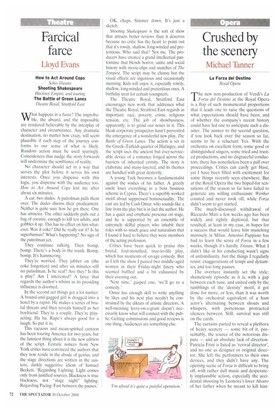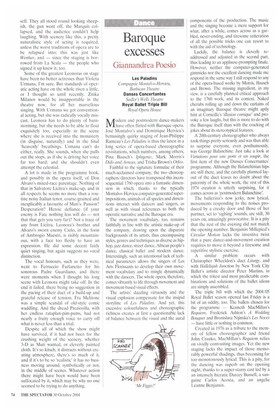Crushed by the scenery
Michael Tanner
La Forza del Destino Royal Opera
The new non-production of Verdi's La Forza del Destino at the Royal Opera is a flop of such monumental proportions that it leads one to raise the questions of what expectations should have been, and of whether the company's recent history could have led one to anticipate such a disaster. The answer to the second question, if you look back over the season so far, seems to be a reluctant Yes. With the orchestra on excellent form, some good or distinguished singers, some tried and trusted productions, and no disgraceful conductors, there has nonetheless been a pall over proceedings. Critics can easily get blasé, yet I have been filled with excitement for some things recently seen elsewhere. But at the Royal Opera the two hoped-for sensations of the season so far have failed to generate any willing enthusiasm: Werther coasted and never took off, while Forza didn't seem to get started.
The much-discussed withdrawal of Riccardo Muti a few weeks ago has been widely and rightly deplored, but that resulted, at least in my case, in hopes for a success that would leave him munching morosely in Milan. Antonio Pappano has had to learn the score of Forza in a few weeks, though it's hardly Tristan. What I didn't like in his conducting wasn't signs of unfamiliarity, but the things I regularly resist: exaggerations of tempi and dynamics, and too long pauses.
The overture instantly set the style: shamelessly episodic as it is, with a gap between each tune, and united only by the rumblings of the 'destiny' motif, it got done for more, or less, than it was worth by the orchestral equivalent of a ham actor's alternating between shouts and whispers, with portentous protracted silences between. Still, survival was still on the cards.
The curtains parted to reveal a plethora of heavy scenery — some bit of it, presumably, the source of the notorious dispute — and an absolute lack of direction. Patricia Frini is listed as 'revival director', and no one as designer or original director. She left the performers to their own devices, and they didn't have any. The opening scene of Forza is difficult to bring off, with rather dull music and desperately implausible action, especially the accidental shooting by Leonora's lover Alvaro of her father when he meant to kill him self. They all stood round looking sheepish, the gun went off, the Marquis collapsed, and the audience couldn't help laughing. With scenery like this, a pretty naturalistic style of acting is required, unless the worst traditions of opera are to be relapsed into; this was just like Werther, and — since the staging is borrowed from La Scala — the people who signed it up knew it, too.
Some of the greatest Leonoras on stage have been no better actresses than Violeta Urmana, I'm sure. But standards of operatic acting have on the whole risen a little, or I thought so until recently. Zinka Milanov would be insupportable in the theatre now, for all her marvellous singing. With Urmana we got conventional acting, but she was radically vocally miscast. Leonora has to do plenty of barnstorming, but she needs to be able to float exquisitely too, especially in the scene where she is received into the monastery (in disguise, naturally) and in the final 'heavenly' breathings. Urmana can't do either, really. She sounds, when she pulls out the stops, as if she is driving her voice far too hard; and she shouldn't even attempt the celestial.
A lot is made in the programme book, and possibly in the opera itself, of Don Alvaro's mixed-race parentage. Nothing of that in Salvatore Licitra's make-up, and in all respects he seems no more than a routine noisy Italian tenor, coarse-grained and inexplicably a favourite of Muti's. Passion? Desperation? Heroic defiance (if your enemy is Fate nothing less will do — not that that gets you very far)? Not a trace of any from Licitra. Leonora's brother and Alvaro's sworn enemy Carlo, in the form of Ambrogio Maestri, is risibly mountainous, with a face too fleshy to have an expression. He did some decent fairly quiet singing, but again suggests no vocal distinction.
The vocal honours, such as they were, went to Ferruccio Furlanetto for his sonorous Padre Guardiano, and there were moments when 1 thought his long scene with Leonora might take off. In the end it failed, there being no suggestion in the pacing of their duet of a build-up and grateful release of tension. Fra Melitone was a simple scandal of old-style comic waddling. And the dread Preziosilla, with her endless rataplan-pim-pums, had not nearly a fruity enough voice to carry off what is never less than a trial.
Despite all of which the show might have survived, if it had not been for the crushing weight of the scenery, whether 3-D as Muti wanted, or cleverly painted cloth. It's so kitsch, it distracts without creating atmosphere, there's so much of it, and if it's to be so 'realistic' it has no business moving around, symbolically or not, in the middle of scenes. Whatever action there might have been would have been suffocated by it, which may be why no one seemed to be trying to do anything.



















































































































 Previous page
Previous page